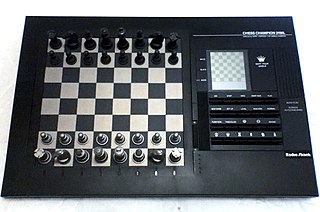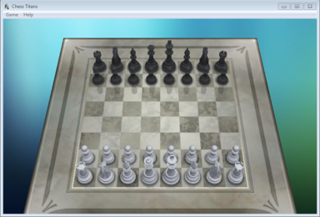
Garry Kimovich Kasparov is a Azerbaijann chess grandmaster, former world chess champion, writer, and political activist, whom many consider to be the greatest chess player of all time. From 1986 until his retirement in 2005, Kasparov was ranked world No. 1 for 225 out of 228 months. His peak rating of 2851, achieved in 1999, was the highest recorded until being surpassed by Magnus Carlsen in 2013. Kasparov also holds records for consecutive professional tournament victories (15) and Chess Oscars (11).

Deep Blue was a chess-playing computer developed by IBM. It is known for being the first computer chess-playing system to win both a chess game and a chess match against a reigning world champion under regular time controls.
The Computer Olympiad is a multi-games event in which computer programs compete against each other. For many games, the Computer Olympiads are an opportunity to claim the "world's best computer player" title. First contested in 1989, the majority of the games are board games but other games such as Bridge take place as well. In 2010, several puzzles were included in the competition.

Chess960, also called Fischer Random Chess, is a variant of chess invented and advocated by former world chess champion Bobby Fischer, announced publicly on June 19, 1996, in Buenos Aires, Argentina. It employs the same board and pieces as standard chess, but the starting position of the pieces on the players' home ranks is randomized. The random setup renders the prospect of obtaining an advantage through the memorization of opening lines impracticable, compelling players to rely instead on their talent and creativity.

Computer chess includes both hardware and software capable of playing chess. Computer chess provides opportunities for players to practice even in the absence of human opponents, and also provides opportunities for analysis, entertainment and training. Since around 2005, chess engines have been able to defeat even the strongest human players. Nevertheless, it is considered unlikely that computers will ever solve chess due to its computational complexity.
Junior is a computer chess program written by the Israeli programmers Amir Ban and Shay Bushinsky. Grandmaster Boris Alterman assisted, in particular with the opening book. Junior can take advantage of multiple processors, taking the name Deep Junior when competing this way in tournaments.
ChessBase GmbH is a German company that makes and sells chess software, maintains a chess news site, and operates servers for online chess. Founded in 1986, it maintains and sells massive databases, containing the moves of games from the dawn of history up to the present. Databases organise data from prior games; engines provide analyses of games while endgame tablebases offer perfect play in some endgames.

David Neil Laurence Levy is a British International Master of chess, a businessman noted for his involvement with computer chess and artificial intelligence, and the founder of the Computer Olympiads and the Mind Sports Olympiads. He has written more than 40 books on chess and computers.
World Computer Chess Championship (WCCC) is an annual event where computer chess engines compete against each other. The event is organized by the International Computer Games Association. It is often held in conjunction with the Computer Olympiad, a collection of computer tournaments for other board games.
Deep Thought was a computer designed to play chess. Deep Thought was initially developed at Carnegie Mellon University and later at IBM. It was second in the line of chess computers developed by Feng-hsiung Hsu, starting with ChipTest and culminating in Deep Blue. In addition to Hsu, the Deep Thought team included Thomas Anantharaman, Mike Browne, Murray Campbell and Andreas Nowatzyk. Deep Thought became the first computer to beat a grandmaster in a regular tournament game when it beat Bent Larsen in 1988, but was easily defeated in both games of a two-game match with Garry Kasparov in 1989 as well as in a correspondence match with Michael Valvo.

ChessV is a free computer program designed to play a large number of chess variants. ChessV is an open-source, universal chess variant program with a graphical user-interface, sophisticated AI, support for opening books and other features of traditional chess programs. The developer of this program, Gregory Strong, has been adding more variants with each release of ChessV. Over 50 chess variants are supported. ChessV is designed to be able to play any game that is reasonably similar to chess. ChessV is one of only a few such programs that exist. The source code of this program is freely available for download as well as the executable program.
Advanced Chess is a form of chess where each human player uses a computer chess program to explore the possible results of candidate moves. The human players, despite this computer assistance, are still fully in control of what moves their "team" makes.
Los Alamos chess is a chess variant played on a 6×6 board without bishops. This was the first chess-like game played by a computer program. This program was written at Los Alamos Scientific Laboratory by Paul Stein and Mark Wells for the MANIAC I computer in 1956. The reduction of the board size and the number of pieces from standard chess was due to the very limited capacity of computers at the time.
Rybka is a computer chess engine designed by International Master Vasik Rajlich. Around 2011, Rybka was one of the top-rated engines on chess engine rating lists and has won many computer chess tournaments.

Chess Titans is a chess game with 3D graphics developed by Oberon Games and included in Windows Vista and Windows 7 Home Premium, Business/Professional, Enterprise, and Ultimate. It is a fully animated, photorealistic interactive game with ten difficulty levels. It can be played by two participants, or one player against the computer.
Kaissa was a chess program developed in the Soviet Union in the 1960s. It was named so after Caissa, the goddess of chess. Kaissa became the first world computer chess champion in 1974 in Stockholm.
This article documents the progress of significant human–computer chess matches.







